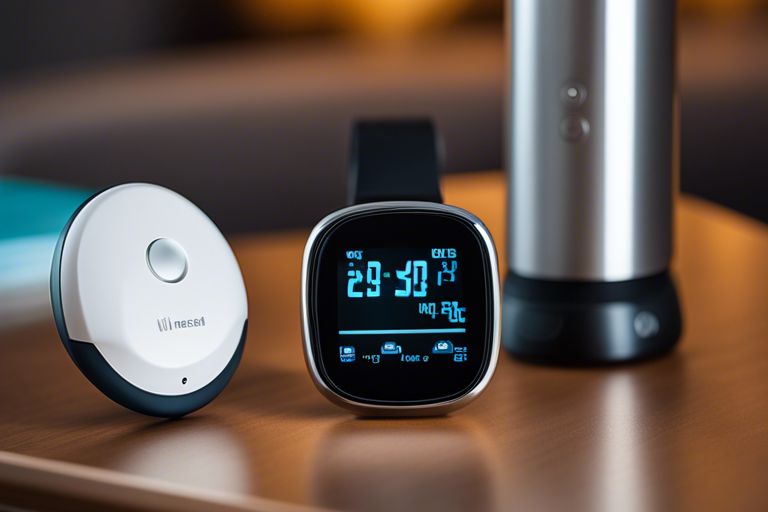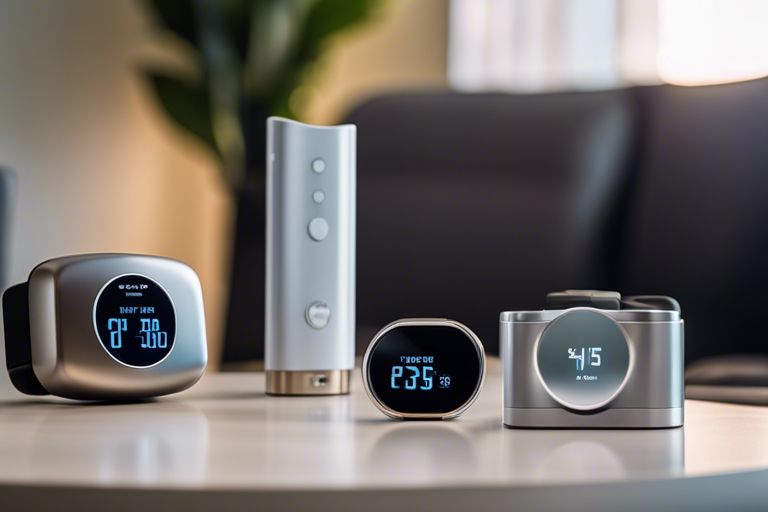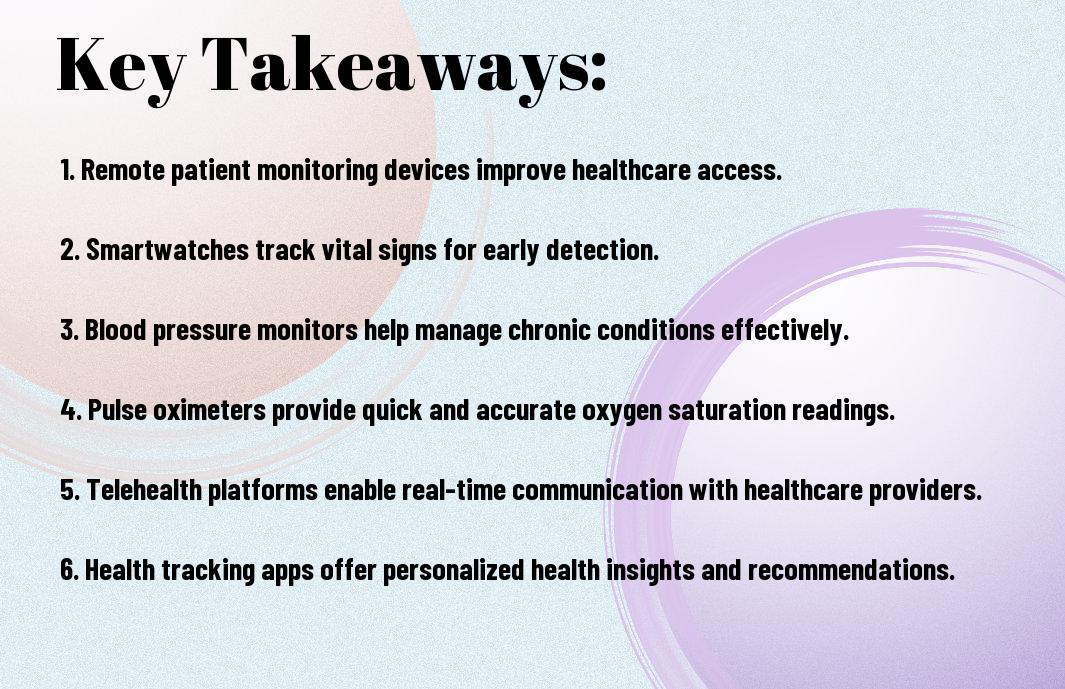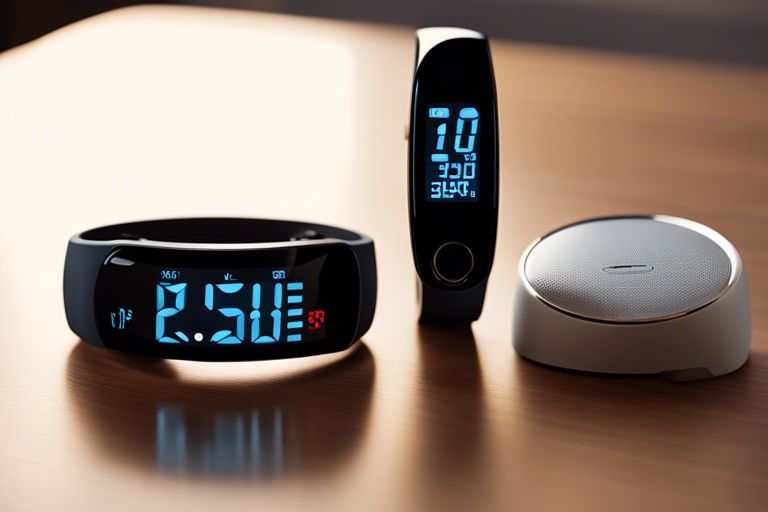
It’s time to take charge of your health with the 3 Best Tools for Home Health Monitoring. From tracking your heart rate and activity levels to monitoring your sleep quality, these devices offer valuable insights into your overall well-being. To explore more vital health monitoring devices, check out 6 Essential Health Monitoring Devices … – Atlas Biomed. Let’s investigate the world of home health monitoring and empower ourselves with knowledge.

Key Takeaways:
- Remote Patient Monitoring Devices: These tools allow healthcare providers to keep an eye on patients’ vital signs without the need for in-person visits.
- Smart Wearables: With features like heart rate monitoring and activity tracking, smart wearables can help individuals stay on top of their health goals.
- Telemedicine Platforms: These platforms provide a convenient way for patients to connect with their healthcare providers from the comfort of their own homes.
In today’s fast-paced world, staying on top of our health can be a challenge. But with the right tools, like remote patient monitoring devices, smart wearables, and telemedicine platforms, we can take control of our health from the comfort of our own homes. So why not embrace the power of technology to keep ourselves healthy and happy? With these tools at our disposal, we can monitor our health, track our progress, and stay connected to our healthcare providers like never before. Who knew that taking care of ourselves could be so high-tech and convenient?

The Importance of Home Health Monitoring
The health of individuals is crucial for overall well-being and quality of life. Home health monitoring plays a vital role in ensuring that individuals are able to keep track of their health status and make informed decisions about their care.
Why Regular Check-Ups Matter
Regular check-ups are crucial for monitoring any changes in health conditions and identifying any potential issues early on. By regularly monitoring key health indicators, individuals can work with healthcare professionals to address any concerns promptly and prevent any serious complications.
The Benefits of Early Detection
With early detection, individuals have a better chance of treating health conditions effectively and improving their outcomes. By identifying problems early, individuals can take proactive steps to manage their health and prevent any further progression of the condition.
Top Tool #1: Blood Pressure Monitors
Clearly, one of the imperative tools for home health monitoring is a blood pressure monitor. Monitoring your blood pressure regularly can help you keep track of your cardiovascular health and detect any potential issues early on.
How They Work
They work by measuring the force of blood against the walls of your arteries as your heart pumps. Blood pressure monitors typically consist of a cuff that is wrapped around your upper arm and a digital monitor that displays your readings.
Features to Look For
With blood pressure monitors, accuracy is key. Look for monitors that have been clinically validated to ensure they provide reliable readings. Additionally, consider monitors that have adjustable cuffs to ensure a proper fit for accurate results.
Monitors with features such as irregular heartbeat detection, multiple user memory storage, and large, easy-to-read displays can also enhance the user experience and make monitoring your blood pressure more convenient.
Recommended Brands
On the market, there are several brands known for their quality blood pressure monitors. Some of the top recommended brands include Omron, Welch Allyn, and Withings. These brands are trusted by healthcare professionals and consumers alike for their accuracy and reliability.
Work with your healthcare provider to choose the best blood pressure monitor that suits your needs and monitor your blood pressure regularly to take control of your heart health.
Top Tool #2: Pulse Oximeters
What They Measure
With the rise of telemedicine, pulse oximeters have become necessary tools for monitoring oxygen saturation levels and heart rate from the comfort of your own home. These devices clip onto your fingertip and use light to measure the oxygen saturation in your blood.
Accuracy and Reliability
One crucial aspect to consider when choosing a pulse oximeter for home use is its accuracy and reliability. These devices are typically quite dependable when used correctly, providing accurate readings of oxygen saturation levels and heart rate.
One thing to keep in mind is that factors like poor circulation or nail polish can affect the accuracy of the readings. It’s necessary to follow the manufacturer’s guidelines and ensure proper usage for the most reliable results.
Best Options for Home Use
What sets pulse oximeters apart in terms of the best options for home use are features like Bluetooth connectivity, user-friendly interfaces, and adjustable display settings. Some models even come with alarms to alert you to dangerously low oxygen levels.
Accuracy and ease of use are key considerations when selecting a pulse oximeter for home health monitoring. Look for devices with high accuracy ratings and clear display screens for effortless monitoring and peace of mind.
Top Tool #3: Thermometers
All households should have a thermometer on hand for easy health monitoring. Thermometers are indispensable in keeping track of body temperature, which is crucial for detecting illnesses early on. Concerning thermometers, there are various types available, with digital and analog being the two main categories.
Digital vs. Analog
To begin with, digital thermometers are more user-friendly and provide quick and accurate readings. They are ideal for all ages and offer features like easy-to-read displays and memory recall for previous readings. On the other hand, analog thermometers, such as mercury or glass models, are more traditional but require longer reading times and may not be as precise as their digital counterparts.
Infrared vs. Oral
Oral thermometers are commonly used and placed under the tongue to measure body temperature. On the other hand, infrared thermometers are non-contact devices that measure temperature from a distance. Infrared thermometers are especially beneficial for households with multiple members as they eliminate the need for frequent sterilization between uses and reduce the risk of cross-contamination.
Plus, infrared thermometers provide almost instantaneous results and are ideal for monitoring temperature without disturbing a sleeping child or other family members.
Top-Rated Thermometers for Home Use
An important feature to consider when selecting a thermometer for home use is accuracy and ease of use. Infrared thermometers have gained popularity for their quick and contactless readings, making them suitable for all family members. Models with features like fever alarms and memory storage for multiple readings can further enhance the monitoring process.
Infrared thermometers are also preferred for their versatility in measuring not only body temperature but also the temperature of objects like baby formula or bathwater.
Key Features to Consider
Keep in mind a few key features when selecting the best home health monitoring tools for your needs:
- Accuracy: Ensure the device provides precise readings to monitor your health effectively.
- Portability: Choose a tool that is easy to carry around and use on-the-go.
- Connectivity: Look for tools that can sync with your smartphone or computer for easy data tracking.
Though these features may vary depending on the type of health monitoring tool, considering them will help you make an informed decision.
Ease of Use
Features such as user-friendly interfaces, clear instructions, and simple setup can greatly impact the user experience. Ensuring that the tool is intuitive and easy to operate can make monitoring your health less daunting and more accessible to all users.
Accuracy and Precision
The accuracy and precision of the health monitoring tool are crucial for obtaining reliable data. Having precise measurements can help you and your healthcare provider track changes in your health more effectively and make informed decisions.
Portability and Storage
Ease of transport and storage is imperative when selecting a home health monitoring tool, especially if you plan to use it regularly. Choosing a tool that is compact and has convenient storage options can make it simpler to incorporate monitoring into your daily routine.

What Makes These Top 3 Home Health Monitoring Tools Stand Out Among the Top 10?
When it comes to top home health monitoring tools, these top 3 stand out among the top 10 for their accuracy, user-friendly interfaces, and advanced data tracking capabilities. These tools provide comprehensive insights into vital health metrics, empowering users to take control of their well-being from the comfort of their home.
Tips for Effective Home Health Monitoring
Unlike traditional healthcare settings where patients receive constant monitoring from medical professionals, home health monitoring relies on individuals taking charge of their own health. To effectively monitor your health at home, consider the following tips:
- Establish a routine: Set specific times each day to check your vitals or symptoms.
- Keep track of results: Record your data consistently to spot any trends or changes.
- Know when to consult a doctor: Understand when your symptoms warrant professional medical attention.
Perceiving these tips can help you maintain a proactive approach to your health and well-being.
Creating a Routine
Creating a routine for monitoring your health can help you stay organized and consistent in tracking your vitals or symptoms. Whether you choose to monitor your blood pressure daily or track your glucose levels regularly, establishing a routine can make home health monitoring more manageable and effective. For more insights on establishing a routine, check out the Top 7 remote patient monitoring software tools for 2024.
Keeping Track of Results
Results from home health monitoring can provide valuable insights into your overall health. By keeping track of results consistently, you can identify any patterns or fluctuations that may require further attention. This data can also help your healthcare provider make informed decisions about your treatment plan, ensuring you receive the best possible care.
Creating a system to track and review your results regularly is important for effective home health monitoring. Whether you use a digital health monitoring tool or a simple journal, maintaining accurate records can empower you to make informed decisions about your health.
When to Consult a Doctor
Results from your home health monitoring should not replace professional medical advice. When you experience any concerning symptoms or notice significant changes in your health data, it is crucial to consult a doctor promptly. Your healthcare provider can offer personalized guidance based on your unique health profile and help you navigate any potential health concerns.
With home health monitoring, staying proactive and informed about your health is key to managing chronic conditions or ensuring overall wellness. By following these tips and being vigilant about your health data, you can take control of your well-being and make informed decisions about your care.
To wrap up
The 3 best tools for home health monitoring discussed in this article provide a convenient and efficient way for individuals to track their health from the comfort of their homes. With devices like smart scales, fitness trackers, and blood pressure monitors, users can stay on top of their health goals and monitor key metrics regularly. These tools offer a simple and accessible way to take charge of one’s well-being, making health monitoring more manageable and less intimidating.
The convenience of these home health monitoring tools allows individuals to stay proactive about their health without the need for frequent doctor visits. By incorporating these devices into daily routines, users can gain valuable insights into their health trends and make informed decisions about their lifestyle choices. With advancements in technology, monitoring health at home has never been easier, empowering individuals to prioritize their well-being and take control of their health outcomes.
FAQ
Q: What are the 3 best tools for home health monitoring?
A: The 3 best tools for home health monitoring are smart scales, blood pressure monitors, and fitness trackers.
Q: How can smart scales help with home health monitoring?
A: Smart scales can track weight, body fat percentage, and even heart rate, providing valuable insights into your overall health and fitness levels.
Q: Why are blood pressure monitors important for home health monitoring?
A: Blood pressure monitors help in managing hypertension and keeping track of your blood pressure levels regularly, which is crucial for preventing heart diseases and strokes.
Q: What are the benefits of using fitness trackers for home health monitoring?
A: Fitness trackers can monitor your daily activity levels, heart rate, sleep patterns, and even calorie intake, helping you stay active and maintain a healthy lifestyle.
Q: How can these tools improve overall health and well-being?
A: By providing real-time data and personalized insights, these tools can motivate individuals to make healthier choices, stay active, and monitor their progress towards their health goals.
Q: Are there any recommended brands for these home health monitoring tools?
A: Some popular brands for smart scales include Fitbit, Withings, and Eufy. For blood pressure monitors, Omron and Greater Goods are highly recommended. Fitbit, Garmin, and Apple are leading brands for fitness trackers.
Q: How can one incorporate these tools into their daily routine for effective monitoring?
A: To effectively utilize these tools, set specific health goals, track your progress regularly, and use the data to make informed decisions about your diet, exercise, and overall lifestyle choices.


No Comments